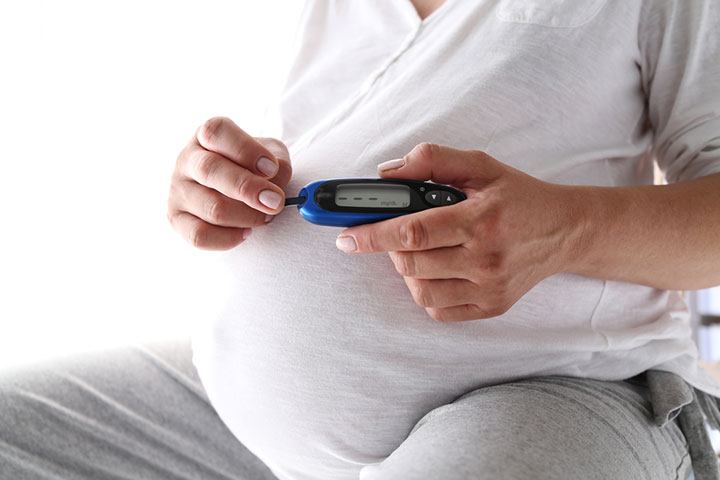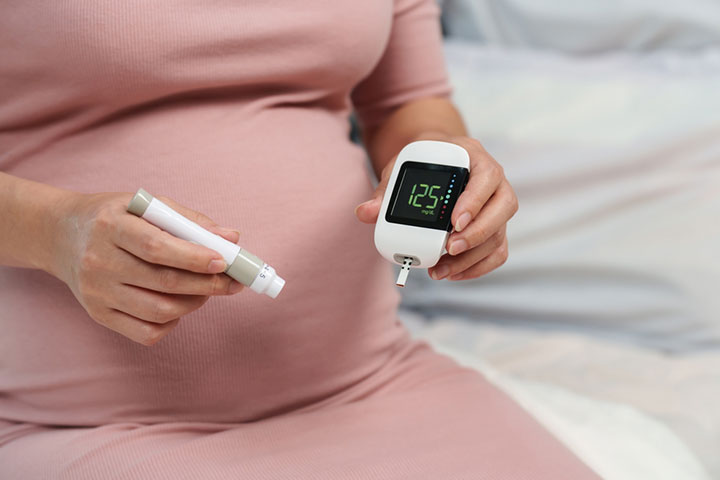
Image: Shutterstock
Hey there, expecting mom! Pregnancy is a whirlwind of anticipation and joy, but sometimes, unexpected visitors like gestational diabetes might pop up along the way. This temporary condition can stir things up a bit in your pregnancy. But fret not! With a little insight and guidance, you can sail through this phase smoothly. Let’s dive into what gestational diabetes is all about, from its causes and symptoms to its impact on pregnancy and the tips to manage it. Think of this as your go-to handbook, designed to help you through your pregnancy with confidence. Read on to know more!
Understanding The Causes
Image: Shutterstock
1.Pregnancy’s Insulin Demand
So, here’s the deal – when you’re expecting, your body hustles to accommodate the growing life within. Hormones go haywire, and the demand for energy spikes. This is where insulin, the hormone that regulates blood sugar, steps in. But during pregnancy, the body sometimes needs more insulin than usual. However, the trouble begins when the body cannot produce the needed amount of insulin.
2.Insufficient Insulin Production
Gestational diabetes happens when your body can’t keep up with this increased demand for insulin (1). Your pancreas (the insulin-making factory in your body) might struggle to produce enough. It’s like a traffic jam — your body needs more insulin, but the production line can’t meet the demand.
3.Hormonal Hijinks
Blame it on the hormones! These little powerhouses play a major role. Some hormones produced by the placenta during pregnancy can make your body more resistant to insulin. This resistance can lead to higher blood sugar levels.
4.Genetic Factors At Play
Image: Shutterstock
Genetics might also have a say in this equation. If diabetes runs in your family or if you’ve had gestational diabetes in a previous pregnancy, your risk might be slightly higher (2). It’s like a subtle nod from your genes, reminding your body about this possibility.
Spotting The Signs
Image: Shutterstock
1.Silent Intruder: Lack Of Symptoms
Gestational diabetes is a sneaky one — it often operates undercover, showing no noticeable signs. This stealth mode makes it tricky to detect without proper screening. Some women sail through pregnancy without any telltale signs, making routine screenings essential to catch it early.
2.Clues To Notice
Though gestational diabetes can be a silent visitor, a few hints might drop by unexpectedly. Keep an eye out for increased thirst, especially when it feels excessive. Frequent urination, more than the typical pregnancy bathroom trips, can also be a flag. Add extreme fatigue to the mix, feeling more drained than the usual pregnancy fatigue, and it might prompt a conversation with your healthcare provider.
3.Routine Screening
Image: Shutterstock
Around weeks 24 to 28 of pregnancy, your healthcare provider is likely to schedule a screening for gestational diabetes. This screening involves a glucose challenge test or a glucose tolerance test. It’s a proactive step to check how your body processes sugar. Don’t skip this appointment; it’s your best shot at catching any lurking gestational diabetes early on.
Impact On Pregnancy
Gestational diabetes might throw a curveball in your pregnancy game. It can up the risk of complications for you and your baby. High blood sugar levels might lead to a bigger baby, making labor trickier (3). It can also heighten the chances of preterm birth or the need for a C-section. But hey, with proper management, you can tackle these challenges.
Treatment And Management
Image: Shutterstock
So, what’s the game plan? Good news: you’ve got options! Your doctor might suggest keeping an eye on your diet, focusing on healthier food choices, and being more active. Sometimes, they might also prescribe insulin or other medications to keep those blood sugar levels in check.
Preventive Measures?
Image: Shutterstock
Now, about prevention, unfortunately, there’s no surefire way to dodge gestational diabetes entirely. But, you can stack the odds in your favor! Maintain a healthy weight before pregnancy, eat a balanced diet, and stay active. Keeping these habits during pregnancy can lower the risk. Here are some ways that might help you with gestational diabetes:
1.Lifestyle Tweaks
You’ve heard it before, but it’s worth repeating: healthy habits are your friends! Keep those meals balanced, with a mix of veggies, lean proteins, and whole grains. Avoid the sugar bombs and opt for smaller, frequent meals instead. Sneak in some exercise — a brisk walk or prenatal yoga can work wonders!
2.Regular Check-Ins
Your healthcare team will be your partners through the pregnancy. They’ll keep tabs on your blood sugar levels through regular check-ups. Don’t skip these appointments; they’re crucial for tracking how you and your baby are doing.
Keeping Baby Safe
While gestational diabetes might throw a few hurdles, it’s not a dead end. By staying on top of it, you’re giving your baby the best shot. Monitoring blood sugar, following your doctor’s advice, and maintaining a healthy lifestyle can go a long way in ensuring your little one’s health.
Gestational diabetes might seem like an unexpected guest during your pregnancy, but armed with information and support, you’ve got this! Remember, it’s not a life sentence — it’s a temporary phase. With proper management, healthy habits, and the guidance of your healthcare provider, you’re well-equipped to manage your pregnancy properly and welcome your bundle of joy into the world.


















